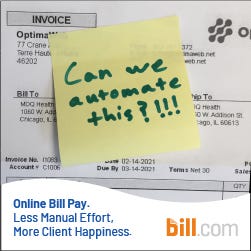Chime's Customer Nightmare Exposes a Fintech Flaw
Will it ding the IPO? Plus, consumers seem wary of Buy Now, Pay Later.
Number of the Week: $11 billion (explanation below)
Chime’s Customer Nightmare Exposes a Fintech Flaw
One of the grand promises of fintech is that digital delivery of financial services is so much faster, more efficient, and more consumer-delighting than traditional banking that it is destined to take over the world not long from now. Some version of that promise may yet prove true; still, on a fairly regular basis, fintech companies mess up their business and infuriate their customers in ulcer-inducing ways.
This week a significant instance of fintech foul-up surfaced (and was curiously ignored by the likes of The New York Times and Wall Street Journal); the award-hoovering nonprofit Web site ProPublica published a pathbreaking story about Chime, which by many yardsticks is the largest digital-only financial provider in the United States. The background here is important: FIN for months has called attention to the major (if not uniformly smooth) role fintech companies have played in delivering government pandemic payments, such as stimulus checks and Paycheck Protection Program loans.
But that impressive quick cash delivery has not always benefited customers: ProPublica found several instances of Chime closing customer accounts based on false conclusions that money had been fraudulently deposited. In one case, a 32-year-father took his children out to lunch the day after his stimulus check had landed in his Chime account, only to have the restaurant deny his Chime debit card, and Chime close his account and refuse to remit to him the $10,000 he thought he had in it. It’s unclear how widespread such problems are, although ProPublica noted that hundreds of complaints to the Consumer Finance Protection Board seem to be about Chime closing customer accounts illegitimately.
Of course such debacles are not unique to fintech; over the decades there have been thousands of stories about big, traditional banks screwing up people’s mortgages or charging them insane overdraft fees when their account balance sinks a few pennies below zero. And it’s also important to remember that Chime is an important financial pioneer. While the banking industry clings to the $30 billion it collects in overdraft fees every year, Chime has introduced SpotMe, which allows qualified customers to spend up to $200 beyond their account balance without charge. “It’s a very low-cost thing for us to do that creates tons of good will,” said Chris Britt, Chime’s chief executive.
Nonetheless, there is some reason to think that the very methods that fintech firms deploy to “disrupt” banking incumbents push them to or beyond the limits of the law and customer satisfaction. To echo the point FIN made last week about Robinhood and Binance, Chime is not some minor player that is maybe skimping on its tech spend. Chime is a market leader with more than 12 million customers and has raised $1.5 billion dollars from prestigious investors such as Tiger Global and DST Global. In March, Reuters reported that the company was working on an IPO that would value it at a phenomenal $30 billion.
As solid and disturbing as ProPublica’s story was, it missed a crucial angle: Chime’s problem is a broader fintech problem. Just as Robinhood’s revolutionary free stock trades make it rely on payment for order flow (which creates all kinds of horrible side effects), Chime’s income streams are so thin that it can’t afford to waste money on trifles like customer service or effective fraud detection. A lot of fintech companies boast about their deployment of AI/ML, but in these early days, this translates as algorithms that don’t work.
As one analyst explained to American Banker:
Chime needs to automate its operations as much as possible to keep its costs low. That’s because it has an extremely limited revenue base — essentially its share of debit interchange revenue — that can’t support costly human-centered customer service. So it pushes customers to email and text-based chatbots and away from phone contact. The result? Frustration when something goes wrong. In this regard, the neobanks are worse off generally than standard banks which typically make it easier to get to a person to resolve issues.
As Chime moves toward IPO, does any of this matter? FIN would argue that it *should*, in the sense that financial services need to build long-term customer trust in order to survive. In the short term, though, it probably won’t even merit a footnote in Chime’s IPO.
Is Buy Now, Pay Later Peaking?
The growth of Buy Now, Pay Later (BNPL) over the last nine months has been breathtaking. Bank of America has estimated that BNPL transactions—which were effectively zero five years ago—could hit $1 trillion by 2025. US market leader Affirm went public early this year and currently has a market capitalization of nearly $18 billion. Sweden-based Klarna raised a massive $639 million round last month that values the firm at $45.6 billion. Based on existing customer uptake, especially in the holiday-spending season, these projections don’t appear obviously out of whack.
And yet, there have been occasional reasons to think that BNPL growth might slow down a little. Surveys in the UK and US have shown that a substantial portion of consumers—between one-third and two-fifths—admit to having fallen behind on BNPL plans.
A recent survey from PayPal and BigCommerce of consumers in the US, UK, and Australia indicates that BNPL has a lot of work to do; only 11% of UK merchants are offering BNPL, compared to 48% in Australia. More challenging is that consumers need to be convinced a) to get off their current habits and b) that BNPL won’t saddle them with hidden debt or fees. Of the 55-60% of consumers who’ve not used BNPL, here are their reasons why:
BNPL will no doubt continue to grow, particularly as banks like Barclays roll out white-label solutions that will increase the service’s availability. But FIN is officially predicting that the growth will not continue at the breakneck pace the world witnessed in late 2020 and early 2021.
FINvestments
🦈Number of the Week: FIN has never before run a “correction” to Number of the Week, but last week we passed along the conventional wisdom that Wise’s public debut—it was, curiously, the first direct listing on the London Stock Exchange—would value the company at between $6 and $7 billion. Turns out, the company is worth $11 billion. This valuation is especially striking, given the perception of a soft floatation market when Deliveroo flopped in March.
🦈The first six months of 2021 have seen more investment in London-based fintech firms than in any entire previous year, Reuters reported this week.
🦈Longtime FIN readers may notice that this week we feature our first advertisements, from the payment firm bill.com, proudly sold via FIN’s colleagues at Worth Media. If your company is interested in sponsoring future editions of FIN, please e-mail advertising@worth.com.







